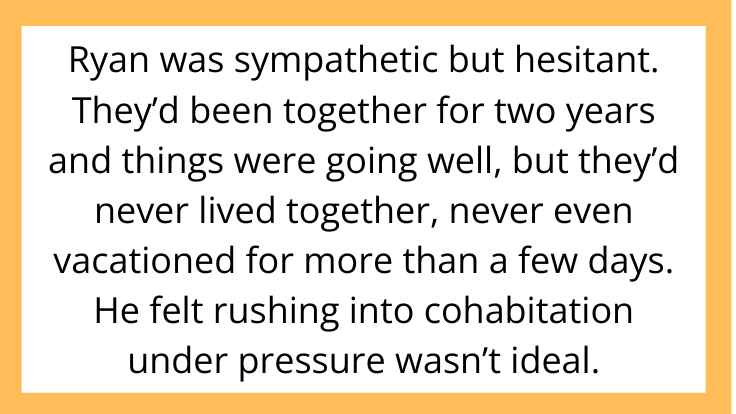AITAH for Not Letting My Girlfriend Move In After She Got Evicted?
When love and logistics collide, things get complicated fast. In today’s AITAH-inspired blogpost, a man finds himself at odds with his girlfriend of two years after saying no to a request that seems reasonable on the surface—but is it really?
Reddit users are divided. Let’s dive into the drama, understand both sides, and unpack the broader themes of boundaries, timing, and emotional responsibility.
The Situation: A Sudden Eviction and an Uncomfortable Ask

The original poster (let’s call him Ryan, 31) explained that his girlfriend, Megan, 29, had been living with a roommate for over three years. They weren’t close friends, just convenient cohabitants. That arrangement abruptly ended when Megan’s roommate decided to move out and sell the apartment.
With less than 30 days to vacate, Megan turned to Ryan for help.
Her request? To move in with him—immediately.
Ryan was sympathetic but hesitant. They’d been together for two years and things were going well, but they’d never lived together, never even vacationed for more than a few days. He felt rushing into cohabitation under pressure wasn’t ideal.
So he said no.
He offered to help her pay for temporary housing, help look for a short-term rental, even let her crash a few nights if needed—but moving in full-time? He wasn’t ready.
Megan was hurt. She called him emotionally unavailable and questioned whether he saw a future with her at all. Their relationship, once stable, suddenly felt fragile.
Drawing Boundaries: Love Doesn’t Always Equal “Yes”

Ryan posted his story on r/AITAH to get an outside perspective. Was he wrong to say no? Was he prioritizing personal space over partnership?
Reddit weighed in.
Supporting Ryan: “You’re Not a Villain for Needing Space”
Many users sided with Ryan. Their key points:
-
Cohabitation Shouldn’t Be a Reaction: Moving in together is a huge step that should come from mutual readiness—not emergency circumstances.
-
Helping Without Sacrificing Comfort: Ryan didn’t abandon Megan; he just proposed alternative support.
-
Healthy Boundaries Aren’t Selfish: Being in a relationship doesn’t mean ignoring your own limits.
As one user put it:
“You’re not a villain for saying ‘I care about you, but I’m not ready to live together yet.’ That’s honest—and responsible.”
Megan’s Side: “If Not Now, When?”
However, a portion of the community sympathized with Megan’s disappointment.
-
Timing Isn’t Always Ideal: Life throws curveballs, and part of being a partner is adapting when those things happen.
-
Perceived Rejection: Megan may have interpreted Ryan’s refusal not as logistical, but emotional—like he was saying she didn’t belong in his future.
Some even argued that if you’re together for two years and still can’t consider living together—even temporarily—maybe you’re not as serious as you think.
Bigger Themes: Boundaries, Pressure, and Compatibility

This isn’t just about moving in together. It’s about differing views on what partnership looks like under pressure.
Emergency Doesn’t Equal Obligation
When people face crises, it’s natural to turn to loved ones. But it’s also valid for loved ones to have boundaries—especially if a crisis would result in a massive lifestyle change, like suddenly sharing living space.
Ryan was trying to be honest about his capacity. That’s not rejection—it’s communication.
Relationships Need Alignment, Not Assumptions
Megan may have assumed that two years together meant they were naturally headed toward cohabitation. Ryan saw their current living situation as fine for now.
The gap between their expectations wasn’t anyone’s fault—but it revealed a deeper conversation they hadn’t had.
Reddit’s Verdict: Not the Villain, But a Wake-Up Call

The majority of commenters declared Ryan NTA (Not The A). But many urged him to use this moment as an opportunity—not just to explain his side, but to better understand Megan’s feelings and their shared future.
Avoiding cohabitation is one thing. Avoiding the conversation about it is another.
Final Take: Sometimes Saying No Is the Most Honest Answer

Ryan’s story reminds us that love doesn’t always mean saying yes. It means showing up in a way that’s sustainable, healthy, and respectful of both partners’ needs.
Saying “I’m not ready” isn’t the same as saying “I don’t love you.” But it does mean both partners need to talk about what the relationship really means—and where it’s going.
Because if your timelines don’t match, love alone might not be enough.



